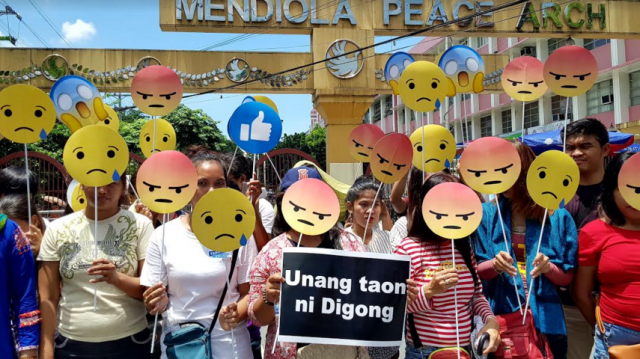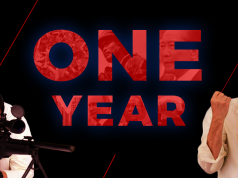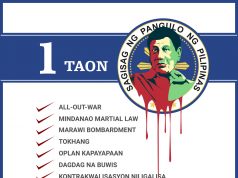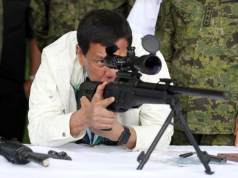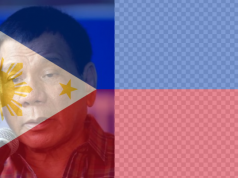(UPDATE – 8:29 P.M.) MANILA, Philippines – They all raised their clenched fists not on Mendiola but inside the Osmeña Room of Malacañang’s Kalayaan Hall. This was the first time in the leftist groups’ history that their ceaseless calls for social change and equality were made inside the corridors of power and with a chief executive who considered himself a socialist.
But political alliances do not always lead to achievement of expectations.
Exactly a year after President Rodrigo Durete invited them to join him in the Palace during his inauguration, the leftist leaders’ admiration for the leader, whom they earlier likened to anti-colonial hero Andres Bonifacio for supposedly not being beholden to imperialist powers, has now diminished.
On Friday, June 30, umbrella organization Bagong Alyansang Makabayan (Bayan) admitted that its optimism during the early months of the Duterte administration “has been dampened by lack of concrete policy measures and even reversals in the President’s pronouncements.”
“The government remains dominated by pro-US miltarists and representatives of the oligarchs. This is not the change the people demand,” Bayan secretary general Renato Reyes Jr. said.
‘Student’ Duterte’s grades in 12 ‘subjects’
In its report card that graded “student” Duterte with emojis, Bayan listed 12 “subjects” pertaining to the key political and socio-economic issues being faced by the administration.
Reyes said the grades that the President had received reflected Bayan’s “disappointment and grave concern” over Duterte’s leadership that showed “some positive developments the past year” but were “overshadowed by the more dominant reactionary, anti-people, pro-foreign trends in the regime.”
The President passed with flying colors in only two “subjects” — Occupy Pabahay — wherein he got a star-struck emoji that means greatly impressed — and Freedom of Information — wherein he bagged a thumbs up sign emoji.
He received a cool emoji in Free Tuition but was given an emoji with a straight mouth, which Bayan said meant “kulang pa [still lacking],” in Land Reform.
Duterte got three pensive emojis, which meant “sad” in Independent Foreign Policy, Peace Talks, and Endo or end of contract, also called labor contractualization.
The chief executive failed in these five subjects with emojis that were angry (Martial Law); loudly crying (War on Drugs); with a broken heart (Nationalist Economic Program); disgusted (LRT/MRT/Traffic); and screaming with fear (Human Rights).
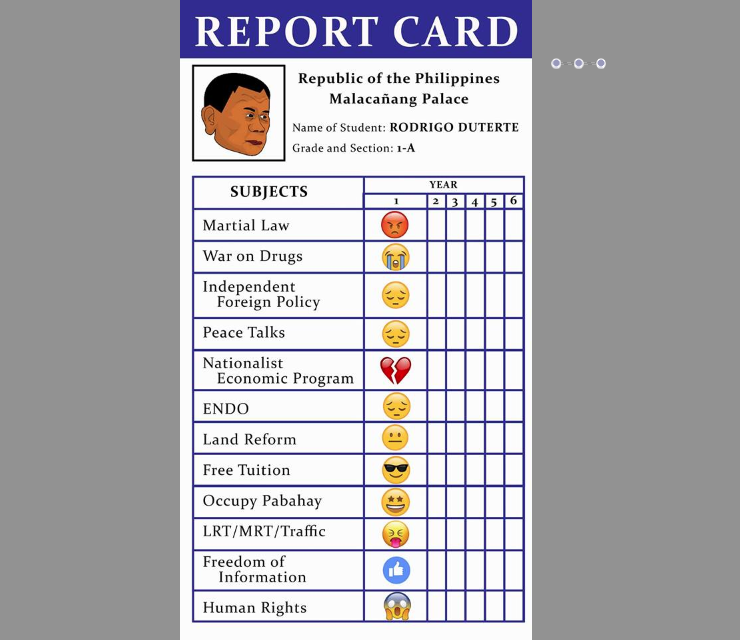
Neoliberal policies
While Bayan acknowledged that the administration “is one of many firsts” that included having ranking leftist leaders in government, Duterte’s assertion of an independent foreign policy, and his openness to dialogue with progressives, it said the President’s regime “is in danger of being no different from past regimes because of its neoliberal economic policy, backtracking on its independent foreign policy, and adopting a fascist internal security policy.”
According to Ibon Foundation, the administration’s 10-point economic agenda remains neoliberal because it “still upholds the failed notion that creating the most profitable market conditions for big business, especially big foreign investors, is the best strategy for economic development.”
“This is certainly the best strategy to increase foreign corporate and oligarch profits but it does not and can never deliver socioeconomic development for the poor majority,” IBON said.
The think tank added that the administration has “continued to neglect national industrialization” and that Duterte’s “economic team wrongly equates ‘made in the Philippines’ by foreign investors as industrialization even if what is really needed is ‘made by Filipinos’ or by Filipino industrial firms.”
As defined by Investopedia, neoliberalism pertains to a policy model of social studies and economics that transfers control of economic factors to the private sector from the public sector. It takes from the basic principles of neoclassical economics, suggesting that governments must limit subsidies, make reforms to tax law in order to expand the tax base, reduce deficit spending, limit protectionism, and open markets up to trade.
In his column written for The Guardian, British writer and political and environmental activist George Monbiot explained that neoliberalism “sees competition as the defining characteristic of human relations.”
“It redefines citizens as consumers, whose democratic choices are best exercised by buying and selling, a process that rewards merit and punishes inefficiency. It maintains that ‘the market’ delivers benefits that could never be achieved by planning,” he said.
Monbiot said that under a neoliberal policy, “attempts to limit competition are treated as inimical to liberty” while “the organisation of labour and collective bargaining by trade unions are portrayed as market distortions” and “inequality is recast as virtuous.”
He added that under the same policy model, “efforts to create a more equal society are both counterproductive and morally corrosive.”
Independent foreign policy or just loyalty shift from one imperialist power to another?
Article II, Section 7 of the 1987 Constitution mandates that, “The State pursue an independent foreign policy.”
The Charter says that, “In its relations with other states the paramount consideration shall be national sovereignty, territorial integrity, national interest, and the right to self-determination.”
In September 2016, Duterte announced that the Philippines would pursue an independent foreign policy that was followed by his declaration of economic and military break with the U.S. and rejection of new grants from the European Union, which was praised by left-leaning groups.
However, the President was criticized by Bayan last May for allegedly “bending backwards to the pro-US sections of the Philippine military” that want to continue the Philippines’ Balikatan exercises with the U.S.
The group said that the holding of the exercises would contradicts Duterte’s earlier promise of pursuing an independent foreign policy.
Also, the Communist Party of the Philippines (CPP) said that while Duterte is different from past Philippine presidents because of his criticism of U.S. intervention in the country, this difference is “more words than action. ”
“His declarations have not translated into concrete and significant changes during his first year in power. In fact, his adherence to US imposition is becoming starker by his slant towards the Armed Forces of the Philippines, the pillar of US domination in the country,” the CPP said this month.
Despite Dutertes anti-US and independent foreign policy rhetoric, the Philippines “remains a US neocolonial state,” according to the CPP.
The party further claimed that Duterte had only transferred his allegiance from one imperialist nation to two other imperialist countries.
“All his threats of repealing unequal treaties between the US and the Philippines have turned out to be empty. He only touched upon US monopoly control over the Philippines to give space to other imperialists,” the CPP said.
“His strong words against the US were apparently meant to impress China and Russia, both anti-US, to persuade them to grant his desired loans, aid, and investment,” it said.
“For the past months, Duterte has been striving to sell the Philippines in the midst of the contradic-tions among the imperialist countries. He has further opened the already foreign investment-dependent Philippine economy to foreign debt, consequently making his government subject to foreign political meddling and military interference,” the CPP added.
Fascism, authoritarian future
On Duterte’s alleged fascist internal security policy, critics are claiming that his leadership style is strongly inclined towards authoritarian rule that threatens human, civil, and political rights.
According to academician and former lawmaker Walden Bello, Duterte’s “project is oriented towards an authoritarian future.”
“He is best described…as a counterrevolutionary. Unlike some of his predecessors, like Hitler and Mussolini, however, he is not waging a counterrevolution against the left or socialism. In Duterte’s case, the target, one can infer from his discourse and his actions, is liberal democracy, the dominant ideology and political system of our time.,” Bello said in a column published last January.
For Sen. Ana Theresia “Risa” Hontiveros, also from Akbayan, Duterte’s first year as the country’s highest leader “is marked by a colossal human rights crisis.”
“It is the year of misogyny and extrajudicial killings. It is a year of national grieving,” she said.
Hontiveros also said that Duterte’s first year in office should be a “day of remembrance” for the victims of extrajudicial killings. The Senator made the appeal one year since the government launched its bloody war on drugs.
“Even as the government downplays this colossal human rights crisis and in some cases, even denies the very existence of these killings, we need to remember. We must never forget or dismiss this sanctioned and deliberate crime against the people,” Hontiveros said.
“The act of remembering is a revolutionary and courageous act. To forget is an assault upon truth. To forget is to erase our humanity. Our collective failure to remember is to kill again,” the senator added.
Click and watch this video clip below:

